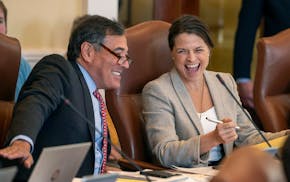Combatants in the legal and political battle over unionizing thousands of in-home child care providers for the first time asked a federal judge Thursday to decide whether the high-stakes election can finally take place.
"Child care providers have a right to vote," Gregg Corwin, representing the American Federation of State, County and Municipal Employees (AFSCME), told U.S. District Chief Judge Michael Davis. "This court should not interfere with a legislative judgment that they have a right to vote."
Doug Seaton, representing providers who oppose the union and want to block the election, said these are private business owners and "no one's employees," and federal law prohibits them from joining a union. "Employers cannot be unionized," he said.
The hearing before Davis produced no immediate ruling but underlined the thorny issues left over from one of the 2013 Legislature's last and most controversial acts — a bill that allowed certain home-based child care providers and personal care attendants to decide whether to unionize. It was narrowly passed by a DFL-controlled Legislature and signed by DFL Gov. Mark Dayton.
The election process is in its earliest stages. AFSCME is seeking to organize child care workers who care for children receiving state subsidies — about 12,700 providers. The Service Employees International Union (SEIU) is seeking to unionize an estimated 9,000 personal care attendants. Jennifer Munt, a spokeswoman for AFSCME, said of the election: "This won't happen any time soon."
The lawsuits contest the portion of the state law covering child care workers only.
The unions have been seeking to organize child care workers in the state for eight years. Dayton's executive order in 2011, which skirted opposition from a Legislature then controlled by the GOP, for a union election was challenged by union opponents and shot down by a Ramsey County district judge. The judge said the issue should be decided by the Legislature, and it was, in 2013, after the DFL had gained control of both houses.
Two groups of child care providers that have long opposed unionization filed separate federal suits against the new law. Seaton, representing one of the anti-union groups, argued that owners of private child-care businesses cannot legally be unionized.
"These are businesspeople who want to run their own lives and livelihoods," he said. "These plaintiffs want to be free."
Solicitor General Alan Gilbert, arguing for dismissal of the suits, said the plaintiffs filed suit long before they could possibly suffer any adverse consequences from the law. He urged Davis to throw out the suits because they are not "ripe" for a decision. A lengthy election process, negotiations and legislative approval must occur before any agreement takes effect, he said.
"It could well be that the agreement will benefit the plaintiffs," Gilbert said.
William Messenger of the Virginia-based National Right to Work Legal Defense Foundation, representing a second group of providers opposed to unionizing, called the measure a case of "collectivizing providers" and added: "Citizens cannot be collectivized to make them happy." He argued that it should be invalidated because it violates the providers' constitutional right of free association.
Messenger's organization focuses on cases to "eliminate coercive union power," according to its website. Dayton said earlier this week that "right-wing extremists" are taking up this fight for political gain.
"There's a lot of right-wing money from all over the country that's going into this fight," he said. "They're opposed to any unions. They're opposed to the right of people to decide for themselves, in a free election, whether they want to join a union."
One of the candidates running against Dayton next year, state Sen. Dave Thompson, R-Lakeville, sat in on the hearing. He opposed the union measure and said he hopes to make it an issue in the gubernatorial battle. "I think that this is something Minnesotans don't want to see happen to these folks," he said, referring to the anti-union providers, "and I'll certainly make it an election issue."
Davis said he would try to make a decision soon on whether the election can proceed. If he fully explores the legal and constitutional issues in the case, it could be a national first, said Messenger of the Right to Work group. "No court has ever ruled on the merits of whether it is constitutional to unionize small businesses who take care of public aid recipients," he said.
Jim Ragsdale • 651-925-5042

Sweeping gun legislation approved by Maine lawmakers following Lewiston mass shooting
The Latest | Seated juror in hush money trial excused as prosecutors ask judge to sanction Trump

